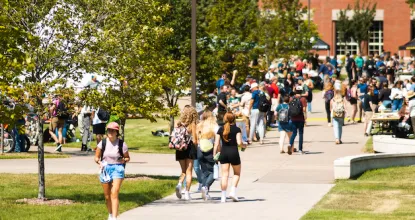Strategic Initiative · Collaborative Sustainability
Northern will begin more extensive exploration on its ability to achieve carbon neutrality, creating a task force to work on a new energy master plan, as well as develop an overall strategic sustainability plan. However, this initiative will focus on more than energy conservation and on-campus recycling as it develops sustainability efforts that reach across all departments and support one of NMU’s core values and the way of the Anishinaabe to plan for sustainability seven generations into the future. The University will focus its initial strategic sustainability planning around five areas: carbon neutrality, improved waste and recycling, protection of fresh water, promoting education and awareness and building local partnerships.
Featured Components
The University will embark on a comprehensive energy study to evaluate its current carbon footprint in any areas not already having been evaluated during the STARS rating process Northern has engaged in over the past three years. This initiative will also look to launch sustainability projects that help resolve local sustainability and environmental issues, explore micro-credential and certificate programs, and secure grant funding to increase support for sustainability/environmental proposals and projects.
The initiative will develop ways to help facilitate collaboration between departments to integrate sustainability planning, curriculum and community-based research projects. Unique learning environments on campus will be considered as space and funding are identified, such as a learning lab for reclaimed materials for recycling and up-cycling experiments and areas for aeroponics and hydroponic infrastructure for indoor food growing and sustainable food production research.
How this will add to NMU’s prestige and distinction:
Students, faculty, staff and partners would become involved in developing and supporting innovations in renewable energy, sustainable food production, ecotourism, and social entrepreneurship. The goal would be for Northern to emerge as a regional, possibly national, leader in preparing students for 21st century careers, providing practical, technical and entrepreneurial skills to build an innovative and sustainable future while the University works to decrease its carbon footprint.
Thinking even bigger:
During the Big Idea campaign, a proposal was made to create SHINE (Sustainability Hub for Innovation and Entrepreneurship), an interdisciplinary hub to improve Northern’s research, action and reputation as a regional leader in sustainability. SHINE would be a physical space for learning and collaborating on sustainability fronts. Donor investment would be needed to help build SHINE and fund its ongoing operations, but this innovative learning environment could be a recruiting attraction for students, faculty and staff.
